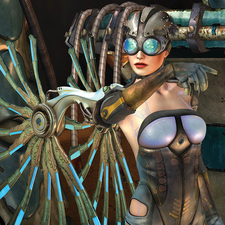Social Hardware's Prosthetic Hand Development Kit
Open Hardware – Prosthetic Hand

© Lead Image © Joerg Michael Gehrke, 123RF.com
In true open hardware spirit, Social Hardware looks to produce a development kit for prosthetic hands to help rural amputees in India.
India has more than half a million upper limb amputees. Most have no hope of a prosthetic, partly because of a world-wide shortage of prosthetic technicians, but mainly because prosthetics start at $30,000, far more than many amputees can afford. In this crisis, any innovative solutions are welcome, and Cameron Norris and Abhit Kumar of Social Hardware [1] are about to launch a crowdfunding campaign to provide one [2]. The campaign will be for the production of a Prosthetic Hand Development Kit, which will allow backers to build a hand for less than $500 – and, Norris hopes, will encourage buyers to donate their results to amputees in India (Figure 1).
Norris' background is in digital marketing. He adds, however, that "I've always gravitated towards design and technology." In pursuing those interests, Norris went to work for Wevolver, a London-based community site for sharing open hardware projects [3]. As part of his work, he documented more than one hundred projects, as well as helping projects with community building and licensing issues, all of which helped him to understand the characteristics of successful open source projects.
[...]
Buy this article as PDF
(incl. VAT)
Buy Linux Magazine
Subscribe to our Linux Newsletters
Find Linux and Open Source Jobs
Subscribe to our ADMIN Newsletters
Support Our Work
Linux Magazine content is made possible with support from readers like you. Please consider contributing when you’ve found an article to be beneficial.

News
-
Parrot OS Switches to KDE Plasma Desktop
Yet another distro is making the move to the KDE Plasma desktop.
-
TUXEDO Announces Gemini 17
TUXEDO Computers has released the fourth generation of its Gemini laptop with plenty of updates.
-
Two New Distros Adopt Enlightenment
MX Moksha and AV Linux 25 join ranks with Bodhi Linux and embrace the Enlightenment desktop.
-
Solus Linux 4.8 Removes Python 2
Solus Linux 4.8 has been released with the latest Linux kernel, updated desktops, and a key removal.
-
Zorin OS 18 Hits over a Million Downloads
If you doubt Linux isn't gaining popularity, you only have to look at Zorin OS's download numbers.
-
TUXEDO Computers Scraps Snapdragon X1E-Based Laptop
Due to issues with a Snapdragon CPU, TUXEDO Computers has cancelled its plans to release a laptop based on this elite hardware.
-
Debian Unleashes Debian Libre Live
Debian Libre Live keeps your machine free of proprietary software.
-
Valve Announces Pending Release of Steam Machine
Shout it to the heavens: Steam Machine, powered by Linux, is set to arrive in 2026.
-
Happy Birthday, ADMIN Magazine!
ADMIN is celebrating its 15th anniversary with issue #90.
-
Another Linux Malware Discovered
Russian hackers use Hyper-V to hide malware within Linux virtual machines.


